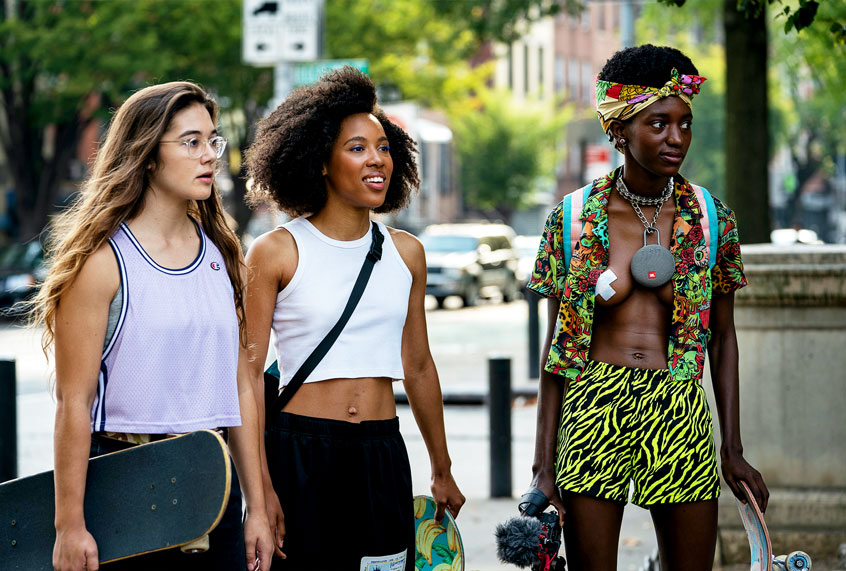In the world of skateboarding, a “Betty” is kind of a dismissive term, a broad-brush term for any girl hanging around the skate park, whether she’s just there to watch the boys, acting as kind of a groupie, or is actually out landing ollies. But out of the mouth of director Crystal Moselle, it’s a gentle reclamation. Her six-episode HBO series “Betty” – which just wrapped its too-brief six-episode run on June 5 – is a leisurely, sun-soaked celebration of a group of Gen-Z young women who find freedom on their boards, gliding their way through the New York City streets towards adulthood.
The series is an extension of Moselle’s 2018 coming-of-age film “Skate Kitchen,” which came about when the director met two members of the Skate Kitchen collective, a real group of female skaters, on the subway. She was initially going to film a documentary about their experiences, but instead opted to create a fictionalized version, with many of the skaters playing scripted versions of themselves, kind of in the same vein as Hulu’s middle school comedy “Pen15.”
None of the main characters were professional actors. Instead, they took less than a year of acting and improv classes before hitting the set, which lends an alluring cinéma vérité element to the film and the series. As a result, “Betty” toggles between a kind of heady rawness, bolstered by lo-fi beats and golden panoramic shots of New York at dusk, and the subtle interrogation — and occasional confrontation — of complex issues of race and identity.
There’s Kirt (Nina Moran), the brassy, lady-killing, burn-out leader of the group. With loud tie-dye tees and backward trucker snapbacks, it’s a delight to watch her both embody and subvert all the “lovable stoner” roles that preceded her. She has her own brand of sloppy feminism that often intersects with her unapologetic flirtatiousness. “If you want to love the vagina,” she counsels some of the skater dudes, “you best love the heart, too.”
She’s balanced out by her best friend, Janay (Dede Lovelace), an outspoken vlogger, and Honeybear (Kabrina “Moonbear” Adams), an aspiring filmmaker and artist who spends much of the season stuck in the intoxicating holding pattern before making the first move on her crush, Ash, a femme skater with an enviable #InstagramShag. Newer to the group is Indigo (Ajani Russell), a low-level weed dealer with the face of a model (and an enviable #TrustFund).
The girls meet Indigo in the first episode after they attempt to throw an “all-girls skate sesh.” It’s not super well-attended (Kirt just kind of threw up an invite on Instagram last-minute), but it introduces us to another important character, Camille (Rachelle Vinberg), a serious 20-year-old skater who spends most of her time trying to be accepted by the guys at the park. To them, she’s just a “Betty,” despite her best efforts — and she finds herself getting closer to the girl skaters as the season goes on.
“Betty” is one of those shows that is more character-driven than plot-driven. It feels like the more meandering, spiritual companion of HBO’s “High Maintenance” (keep an eye out for a cameo by its creator, Ben Sinclair, by the way). Some viewers may find themselves a little impatient with the pacing, but “Betty” consistently delivers unexpected moments of poignancy, which come into plain view as the omnipresent weed smoke clears.
Like when Janay has to grapple with accusations of sexual assault against her co-host/ex-boyfriend (and the realization that she was sexually harassed by him, too). Or when Kirt avoids arrest after a rowdy street brawl while her Black friends, plus Camille, get pinched. Or when Indigo ditches a modeling gig where the art director pushes the participants to embody racist stereotypes, “but commercialized.”
The moment she exits the studio on her board, the ends of her ankle-length red faux fur coat floating behind her, is iconic.
Especially when the chorus of Rico Nasty’s “Smack a Bitch” kicks in.
A dominant theme in “Betty” is the idea that skating provides a temporary escape — from sexism, from racism, from trouble with family and friends. This is the show’s main appeal to viewers, too. The series’ ample, extended shots of these young women of divergent racial and cultural backgrounds traversing New York City on their boards, embracing both their athleticism and freedom, are almost meditative.
Because of this, the freedom that comes from having a hobby and community all your own is a virtue well established by the end of the season, which brings one of the most quietly touching scenes I’ve seen on television so far in recent months. Camille and Kirt begin to teach a young girl how to use a skateboard, guiding her by hand as she wobbles along the street — that is, until her Orthodox Jewish father threatens to call the police if he sees them interacting with his daughter again.
Later, that same little girl finds a board waiting by her doorstep.
“Betty” isn’t fast-paced or bursting with dramatic turns, but therein lies its appeal. This is a show that is about watching a new generation of women empower themselves and the women around them, seemingly in real time. It’s celebratory, intimate and upbeat, perfect for a summer binge.
The full, six-episode season of “Betty” is available to stream on HBO Go, HBO Now, and HBO Max.

